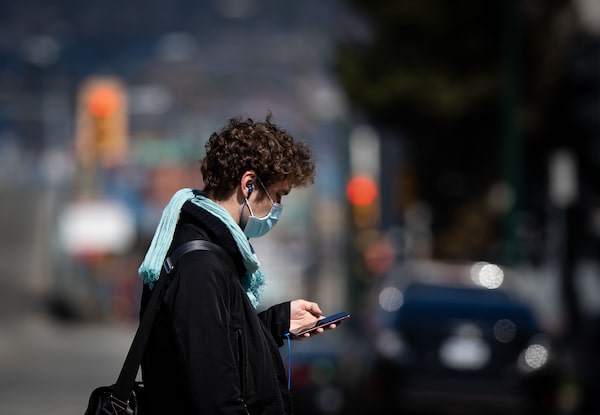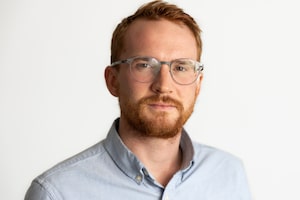
A man wearing a protective face mask looks at his phone while walking in the Downtown Eastside of Vancouver.DARRYL DYCK/The Canadian Press
British Columbia will maintain its vaccine passport at least until the middle of March, becoming the only province outside the Maritimes with no near-term plans to end the restriction of limiting some activities to those who can prove they are double vaccinated.
B.C. announced Tuesday that it would drop capacity limits in restaurants, bars, movie theatres and at gatherings such as weddings and funerals. But masking and vaccine requirements will remain in place until they are reviewed on March 15. A further review of the policy is planned for April 12.
B.C.’s announcement comes the same day that Quebec announced it would drop its vaccine passport on March 14. That decision was a stunning reversal for a province that just weeks ago floated the idea of a tax for the unvaccinated, as Health Minister Christian Dubé says it’s time to “learn to live with the virus.”
Alberta announced last week that it would move swiftly to eliminate vaccine and masking requirements. As of Monday, masks were no longer required in Alberta’s elementary or high schools. Vaccine passports were no longer in force in Saskatchewan as of Monday and Ontario announced yesterday it would abandon its passport on March 1.
But in B.C., Provincial Health Officer Dr. Bonnie Henry said although transmission of the coronavirus and the subsequent hospitalizations are starting to level off, the virus is still circulating in the community. She said the province is keeping its vaccine card system to mitigate risks in indoor, higher-risk settings as it’s taken off restrictions on capacity limits.
“It played a role in reducing and not eliminating the risk of transmission,” Dr. Henry said at a briefing on Tuesday.
“We’ll also be reassessing when its value is no longer needed. And it has to do with the amount of transmission we’re seeing in our communities and where we no longer need to mitigate that risk and people are more comfortable with being together in those indoor discretionary settings.”
Canada adjusts COVID-19 border measures for fully vaccinated travellers
Ottawa will see pushback if tow trucks are forced to clear blockades, towing industry says
Tuesday’s briefing started with B.C. Premier John Horgan’s announcement of scraping restrictions on gatherings and public events on Wednesday at midnight. He said the province is taking a “balanced approach” with advice from Dr. Henry and her team. Mr. Horgan noted these measures were designed to be temporary to address the Omicron wave, and ending those measures has nothing to do with “any protest, any horn honking, any encampments.”
Other polices, such as the visitation restrictions in long-term care facilities, and guidelines for K-12 students and the faith community, will remain in place before Dr. Henry reviews them.
In Quebec, the pass will no longer be required for big-box stores or at the provincial liquor and cannabis retailers starting on Feb 16, Mr. Dubé announced on Tuesday. Places of worship will no longer be required to check for vaccination status as of Feb. 21. The passport will not be required anywhere starting on March 14.
Similar to Mr. Horgan’s remarks, Mr. Dubé said the gradual withdrawal of the vaccination passport is not a response to protests and blockades against public-health measures that have flared up across the country in recent weeks. Rather, he said, it is a sign that the devastating current pandemic wave is becoming less severe.
“We should be happy that we’re able to withdraw the passport because it’s going well,” the Health Minister said. “So let’s take the joy of the news that we’re getting today. The conditions are improving.”
The passport, which required proof of two vaccine doses, became less effective at blocking transmission of the virus as the Omicron variant became dominant, said Dr. Luc Boileau, Quebec’s interim public-health director, at the same press conference. Three doses offered much better protection, but the passport system didn’t require a booster yet.
“The logic is different for before Omicron and after Omicron,” Dr. Boileau said.
The government of Premier François Legault was the first in Canada to introduce a vaccine passport last year and has since expanded its scope to make it the country’s strictest. In January, Quebec made proof-of-vaccination mandatory at big-box stores and the provincial liquor and cannabis retailers. Mr. Legault also raised the possibility of imposing a tax on the unvaccinated before abandoning that idea.
The Premier has spoken often in recent weeks about the importance of ending a “divisive” period of pandemic politics and bringing Quebeckers together by easing public-health measures. Virtually all restrictions will be lifted in the province as of mid-March, except for mask mandates.
There is a possibility that some measures, including the vaccine passport, will be reinstated in the future, if cases spike again, Mr. Dubé said.
“We might need it again,” he said of the government-issued QR codes. “Keep it on your phone.”
None of the Maritime provinces have dropped their proof-of-vaccine programs.
New Brunswick plans to ease some COVID-19 restrictions on Friday, including removing capacity limits on entertainment centres, gyms and restaurants, but these establishments must continue to require patrons to show proof of full vaccination.
Marla MacInnis, a spokeswoman for Nova Scotia’s Health Department, said her province is looking at easing restrictions, and that includes considering the future of the proof-of-vaccine protocol.
Prince Edward Island’s Vax Pass policy will be lifted when the Chief Public Health Office determines the risk of COVID-19 in the province is reduced, according to the provincial government’s website.
Our Morning Update and Evening Update newsletters are written by Globe editors, giving you a concise summary of the day’s most important headlines. Sign up today.
 Xiao Xu
Xiao Xu Eric Andrew-Gee
Eric Andrew-Gee